Generative AI in Marketing: Benefits & 7 Use Cases in 2024
The share of artificial intelligence in the marketing sector is rapidly increasing (see Figure 1). However, the specific effect of generative AI in marketing strategy is not commonly known. However, the market value of AI in marketing worldwide is increasing and generative AI is the new leading factor in AI technology.
Figure 1. Market value of artificial intelligence (AI) in marketing worldwide from 2020 to 2028
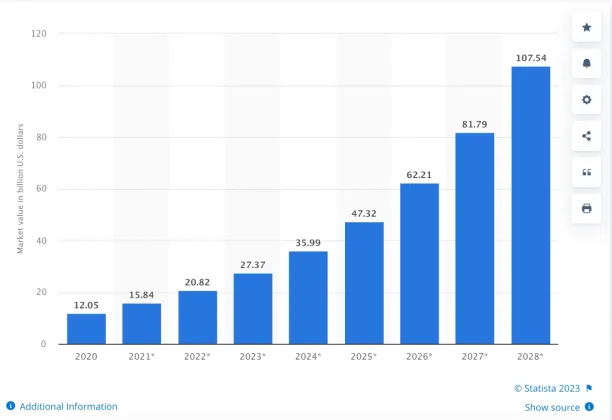
Source: Statista
In this article, we will explain 3 benefits of leveraging generative AI in marketing campaigns, and address 7 use cases with some real life examples.
Top 3 Benefits of Generative AI in Marketing
Generative AI can help create high-quality, relevant content, engaging, and tailored to the needs of specific target audiences. By analyzing customer data and identifying patterns in consumer behavior, generative AI can help marketers create content that resonates with their audiences and inspires action. High quality content can benefit marketers in terms of:
1- Time and budget efficiency through automation
One of the biggest benefits of using generative AI in marketing is increased time and budget efficiency it brings to content creation. The time devoted to composing marketing materials can be decreased in these ways:
- Conversational AI tools like ChatGPT can produce extensive replies in a matter of seconds, which is significantly quicker than what any human could do.
- Unlike search engines, it can evaluate the online information to present a concise summary of the answer.
- Through marketing automation and automated content generation, generative AI can eliminate the need for manual work, freeing up time for marketers and reducing the budget needed for content creation.
- By the elimination of human error and streamlining processes, using generative AI in marketing can help marketers reduce the amount of time and budget needed for certain control tasks.
2- Targeted and personalized content
Using a combination of customer data analysis, natural language processing (NLP), and machine learning algorithms, generative AI tools can create content that is specifically tailored to your target audience.
By analyzing consumer behavior and identifying patterns in their interactions with a particular platform or brand, it can generate unique content strategy to improve customer engagement, based on preferences of customers and outreach them via personalized emails and targeted social media posts.
3- Increased innovation and inspiration
Generative AI provides a powerful tool for businesses to generate innovative and inspirational marketing strategies that can help them stay ahead of the curve and achieve their marketing goals by:
- Encouraging marketers to discover new ideas and approaches to marketing by generating creative concepts and insights that may not have been apparent through traditional methods.
- Assisting them in generating marketing concepts and ideas by drawing inspiration from the important previous experiences of others with tools like ChatGPT that cover the most of the previous online databases.
- Helping businesses identify customer insights, which can be used to create marketing campaigns that are relevant and timely.
7 Use Cases of Generative AI in Marketing
1- Text generation
Text generation using generative AI can be a powerful tool for marketing efforts. These AI-generated texts can be used for a variety of purposes other than generating ideas, such as:
- Content creation for content marketing in the forms of emails, social media posts, blog articles, etc.
- Script writing and storytelling for advertising goods and services (see Figure 2)
- Generating product descriptions that are clear, concise, and engaging
Figure 2. An example for an AI generated content for advertising a new electric car model by using ChatGPT
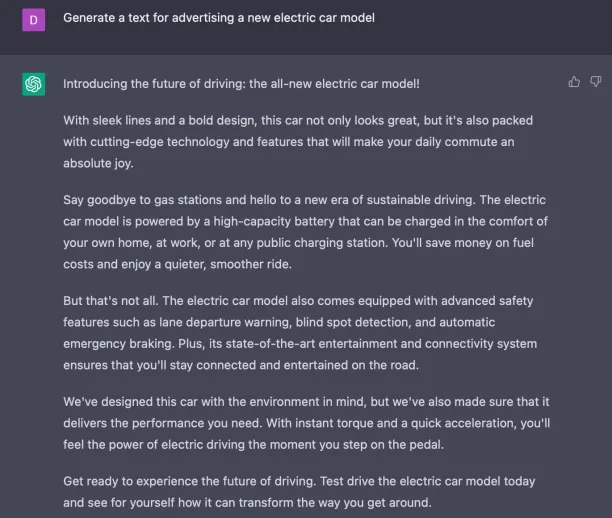
2- Image generation
Here are a few ways in which image generation via generative AI tools like DALL-E can be implemented in marketing:
- Product imagery: By using generative AI in marketing, businesses can create highly realistic images of their products that can be used in online stores, social media, and other marketing materials. This can help to showcase products in a more engaging and visually appealing way, which can lead to increased sales and conversions.
- Visual branding: Generative AI can be used to create visual branding materials, such as logos and graphics.
- Visual try-on: Another use case of generative AI in marketing can be to create virtual try-on experiences, which allow customers to visualize how products will look on them. This can be particularly useful for fashion and beauty brands, as it can help to reduce the number of returns and increase customer satisfaction.
- Ad creative: Generative AI can also be used to create ads that are engaging and visually appealing (see the videos below to see how some famous brands leverage this). By using AI for ad creative, businesses can ensure that their ads stand out from the competition and are more likely to generate clicks and conversions.
Heinz and Nestle adopt generative AI in marketing campaigns. Here are their ad campaign videos generated by AI:
Heinz ad:
Nestle ad:
3- Video generation
Video generation application of generative AI can be useful for marketing in:
- Video ads: With generative AI, businesses can create high-quality video ads that can be used on various platforms, including social media and video sharing sites. This can help to increase brand awareness and drive conversions.
- Product demos: Video generation can also be used to create product demo videos. By using generative AI to create these videos, businesses can showcase their products in a visually appealing way, which can help to increase engagement and sales.
However, users should be careful about the ethical concerns regarding such use cases, like the deep fakes (see the video below). There can be serious ethical problems if not monitored carefully. If you are interested in what these can be, check our article on the ethical concerns around generative AI.
4- Music generation
Music is an important component of many advertisements, and generative AI can be used to create ad music that is optimized for specific campaigns and audiences. By creating music that is tailored to the needs and preferences of a particular audience, businesses can increase the effectiveness of their ads and drive more conversions.
Figure 3. List of some generative AI tools for music generation
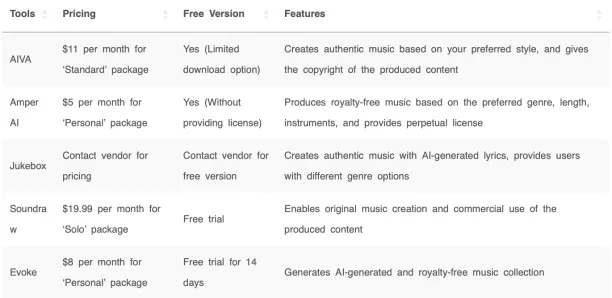
Source: AIMultiple
If you are interested in other generative AI tools, you can read our article on top 35 generative AI tools by category.
5- Chatbots/conversational AI for customer service
Chatbots or conversational AI using generative AI can be a valuable tool for customer service and support in marketing. By using generative AI, businesses can create chatbots or conversational AI that can understand and respond to customer inquiries and provide solutions to common problems. In this way, generative AI can be used in customer services for:
- 24/7 response
- Quick response times
- Multilingual support
6- Sentiment analysis
Generative AI can aid in sentiment analysis by creating synthetic text data that has been labeled with different sentiments such as positive, negative, or neutral. This synthetic data can be used to train deep learning models to analyze real-world text data for sentiment.
Additionally, generative AI can create text that is intentionally designed to convey a specific sentiment, such as positive or negative social media posts that could shape public opinion for marketing campaigns. This approach can also address the issue of data imbalance in sentiment analysis of user opinions, as shown in Figure 4, in various areas like customer service.
Figure 4. High-level overview of a sentiment classification approach
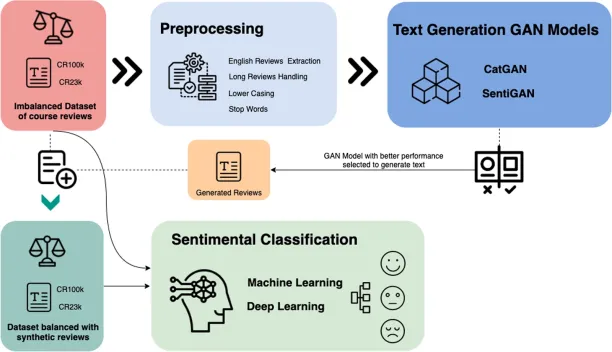
Source1: “The Impact of Synthetic Text Generation for Sentiment Analysis Using GAN-based Models”
Check our article on the use cases of sentiment analysis in marketing to learn more.
7- Search Engine Optimization (SEO)
By analyzing large amounts of data and identifying patterns in consumer behavior, the use of generative AI in market research can help businesses identify SEO friendly, the most relevant and high-performing keywords and phrases for their digital marketing campaigns.
Marketers can utilize generative AI tools like ChatGPT to implement SEO in their content in various ways such as:
- Generating topic ideas for content writing
- Conducting keyword research
- Finding the right titles
- Grouping search intent
- Creating content structure
Business leaders testify that they are leveraging generative AI in marketing to maximize SEO and PR.2 If you are interested in SEO optimization by using artificial intelligence tools, you can check our article on how to achieve SEO by leveraging ChatGPT.
If you have questions about generative AI in marketing or need help in finding vendors, feel free to reach out:
External Links
- 1. “The impact of synthetic text generation for sentiment analysis using GAN based models.” Egyptian Informatics Journal. Accessed 27 February 2023.
- 2. “How Generative AI Is Changing Creative Work.” Harvard Business Review, 14 November 2022. Accessed 27 February 2023.

Cem has been the principal analyst at AIMultiple since 2017. AIMultiple informs hundreds of thousands of businesses (as per similarWeb) including 60% of Fortune 500 every month.
Cem's work has been cited by leading global publications including Business Insider, Forbes, Washington Post, global firms like Deloitte, HPE, NGOs like World Economic Forum and supranational organizations like European Commission. You can see more reputable companies and media that referenced AIMultiple.
Throughout his career, Cem served as a tech consultant, tech buyer and tech entrepreneur. He advised businesses on their enterprise software, automation, cloud, AI / ML and other technology related decisions at McKinsey & Company and Altman Solon for more than a decade. He also published a McKinsey report on digitalization.
He led technology strategy and procurement of a telco while reporting to the CEO. He has also led commercial growth of deep tech company Hypatos that reached a 7 digit annual recurring revenue and a 9 digit valuation from 0 within 2 years. Cem's work in Hypatos was covered by leading technology publications like TechCrunch and Business Insider.
Cem regularly speaks at international technology conferences. He graduated from Bogazici University as a computer engineer and holds an MBA from Columbia Business School.
To stay up-to-date on B2B tech & accelerate your enterprise:
Follow on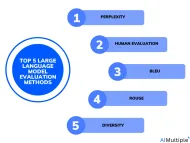
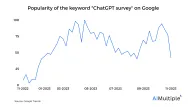
Comments
Your email address will not be published. All fields are required.